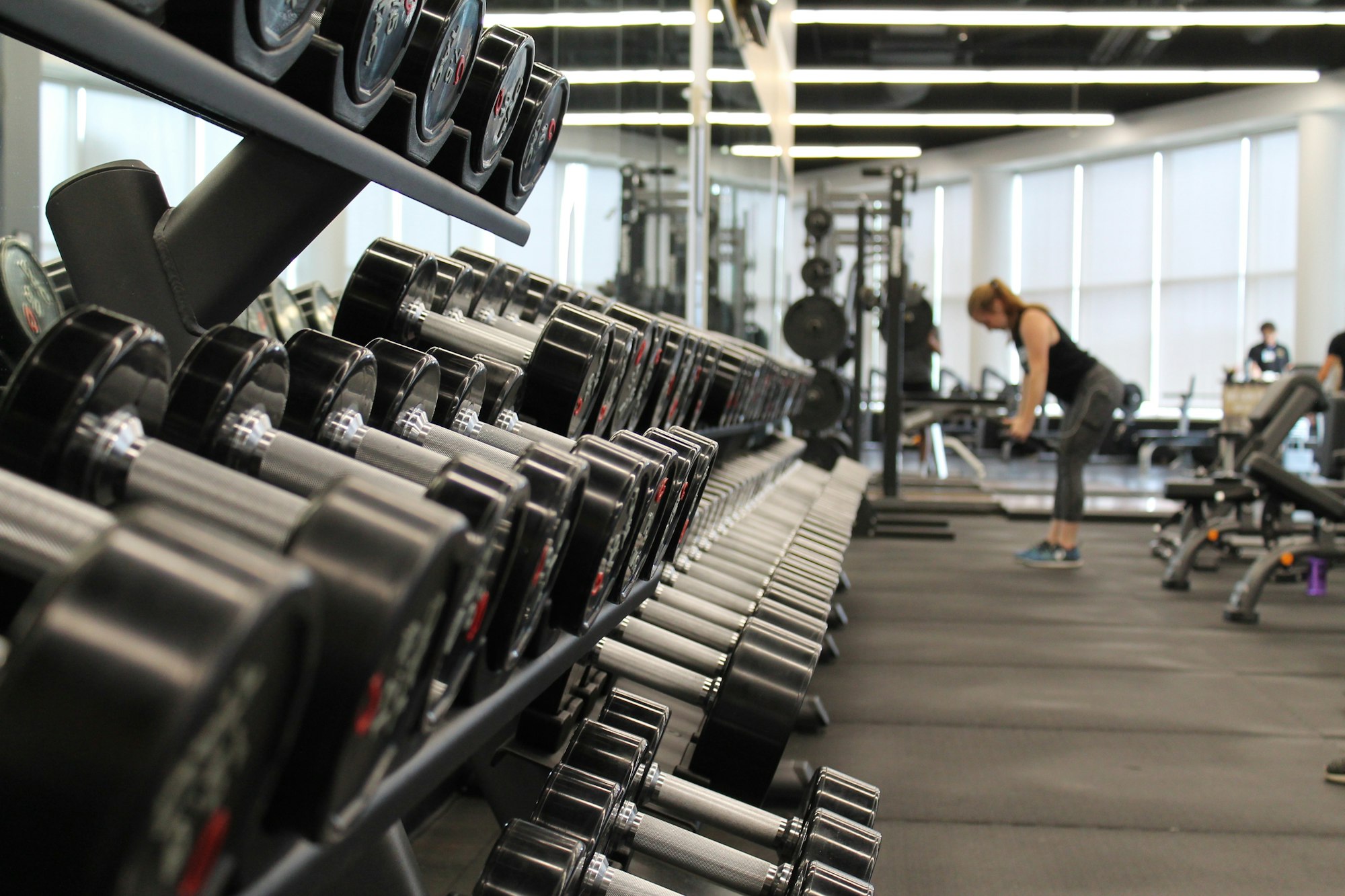13 Half Marathon Tips for Beginners – One for Every Mile!
If you're gearing up for your first half-marathon, trust me, these tips are going to be game-changers for race day!

This article contains affiliate links. Click the arrow to find out more information.
Some of the links below are affiliate links, meaning, at no additional cost to you, I will earn a commission for purchases made through some of the links in this post. However, please note I only recommend products that I have verified and/or personally used.
I ran my first half-marathon a couple of years ago, and honestly, for someone who once came 73rd out of 75 in a school cross-country race, it felt like a massive achievement! Like a lot of people, I started running during lockdown, but I was always more of a short-distance runner (3-5km max). But somehow, my friend convinced me to sign up for the Edinburgh half-marathon.
You don’t have to run your half marathon in your home country. Running is one of those sports you can do just about anywhere – and these European Half Marathons just so happen to be the perfect excuse to book a trip abroad!
I trained for my half marathon for 10 weeks, fitting in about 3-4 runs a week along with some weight training and low-impact exercise. I followed this half-marathon plan for beginners, which took me from barely managing 3-5km to running the full 21km! I finished my first half-marathon in 2 hours and 1 minute (pretty pleased with that!), but looking back, there are definitely a few things I’d do differently if I were running another one... or even a marathon (maybe... we’ll see!).
Even with all that training, I still found the half-marathon incredibly tough as my energy completely dropped off a cliff around 13km, but I’m sure if I’d invested in some of these half-marathon essentials and followed the 13 tips below, it would’ve been a whole lot easier! So, if you're gearing up for your first half-marathon, trust me, these tips are going to be game-changers for race day!
Help My Blog Grow: Share My Pinterest Pins!
Hover over the images, and the Pinterest save button will appear in the top left. Click it to share on Pinterest. Many thanks!
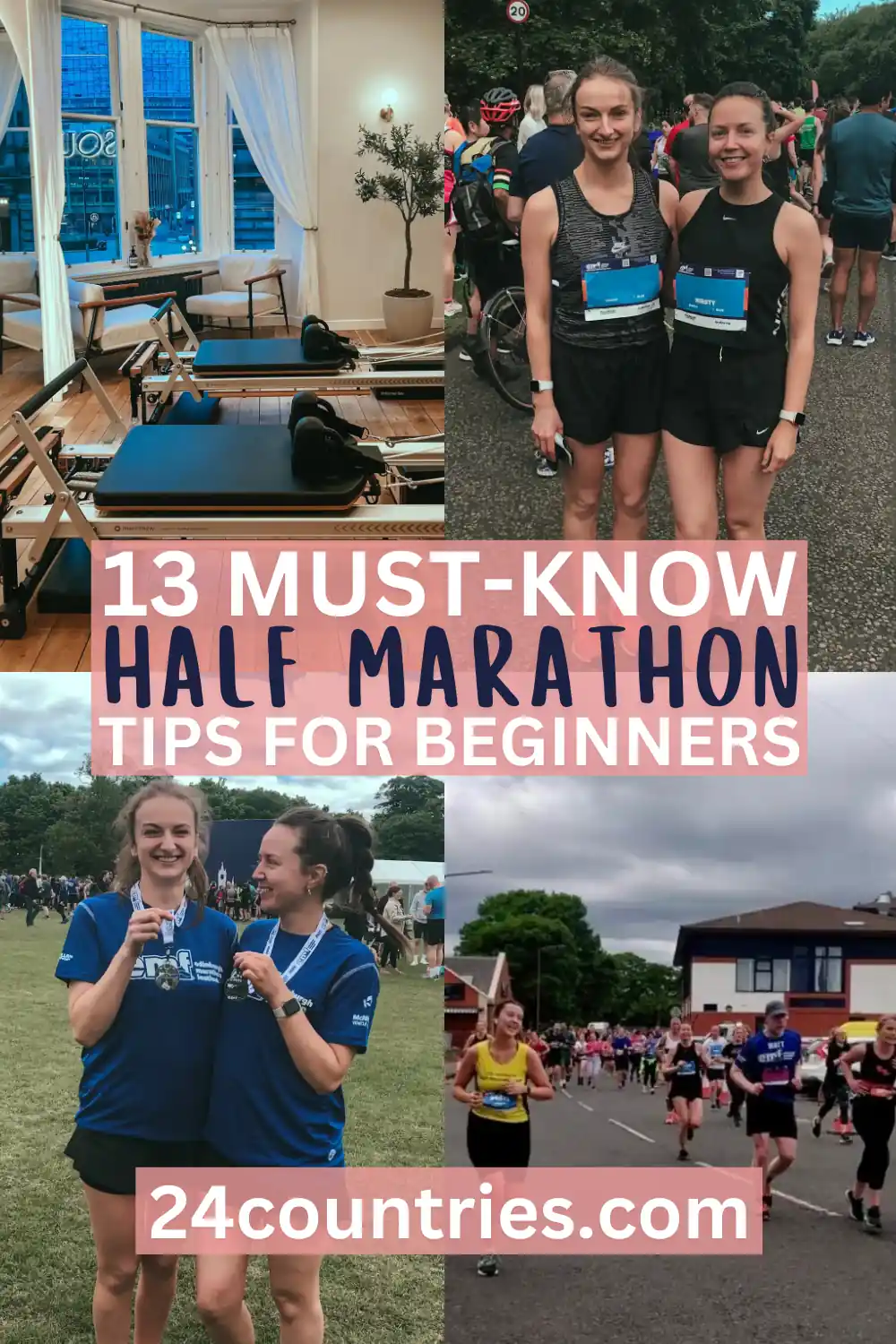
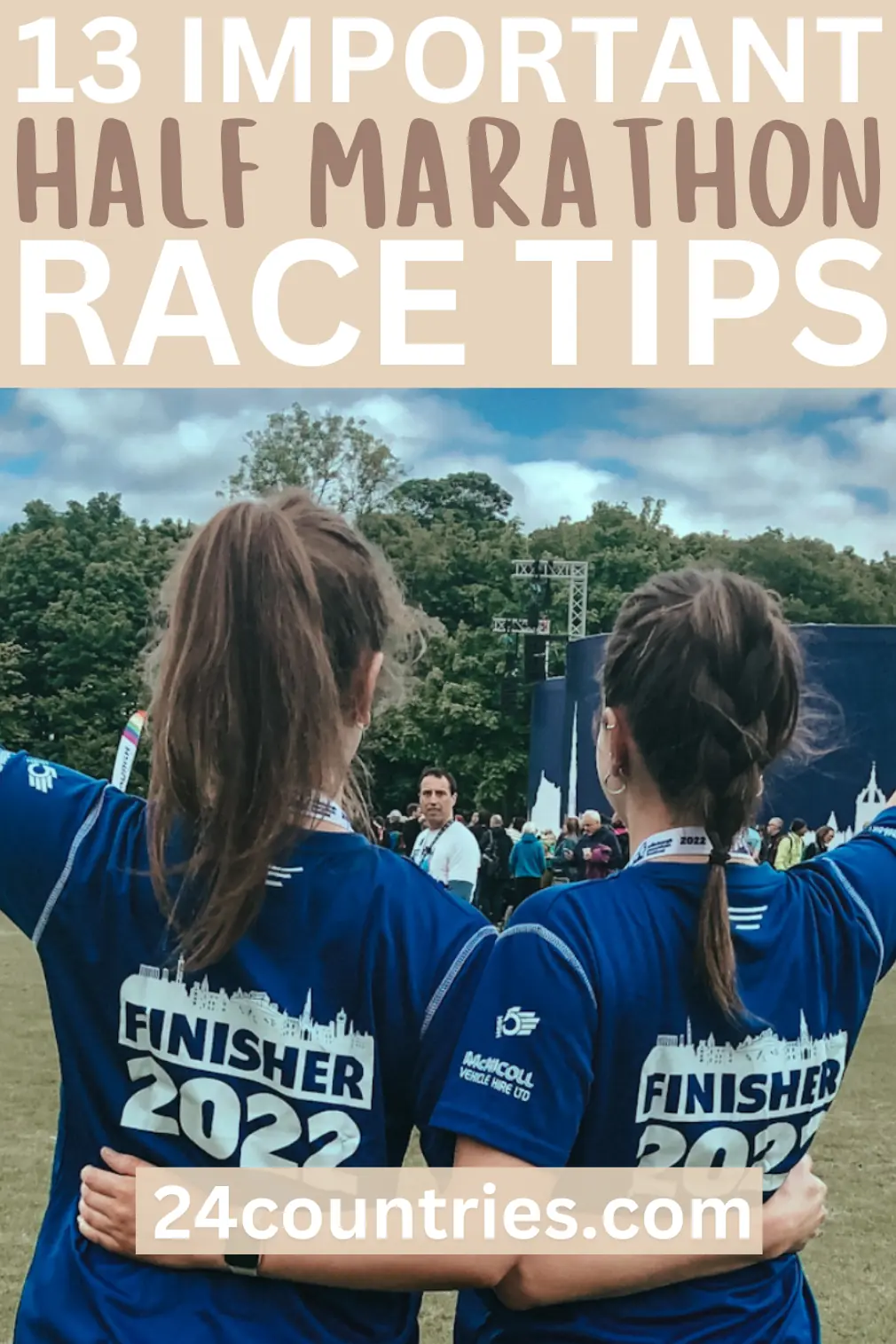
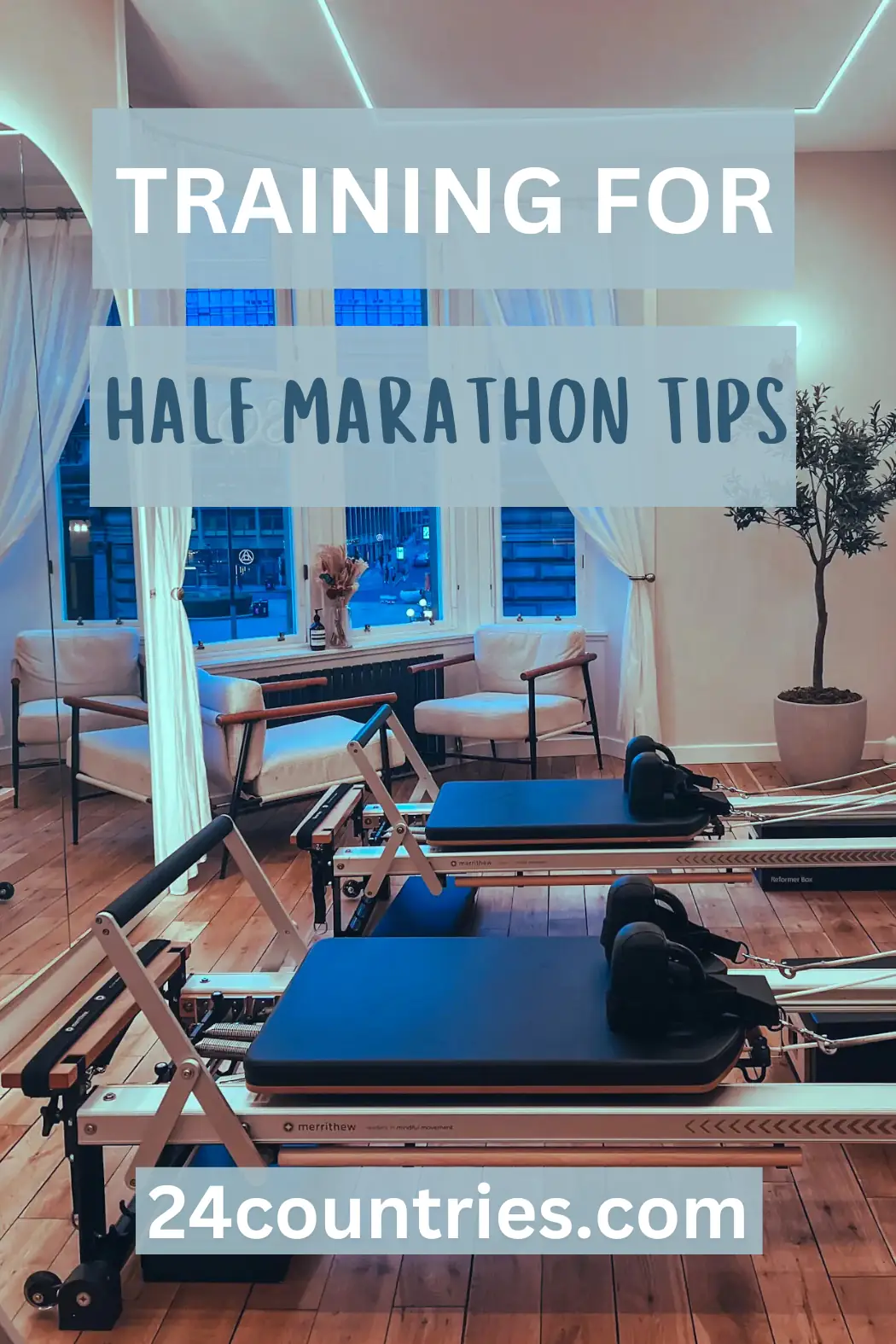
13 Half Marathon Tips for Beginners
Get Proper Running Shoes – Your Feet Will Thank You!
I cannot stress this enough – your shoes will either make or break your race. If I could go back in time, I’d make sure that I didn't run my first half marathon in those £40 Nike "running shoes" I wore to the gym.
Wearing the wrong shoes isn’t just uncomfortable – it can lead to some serious injuries. Luckily, I avoided any major injuries, but the arches of my feet were so sore on every long-distance run. Don’t make the same mistake as me! Invest in a proper pair of running shoes from a specialist store where they analyse your gait and find the right fit for you. On Running Shoes seem to get a lot of love from runners, so they’re a great place to start!
Yes, good running shoes can be eye-wateringly pricey, but trust me, they’re worth every penny. And whatever you do, don’t buy them a week before race day – you need time to break them in and get your feet used to them. Give yourself a few months to train in them!
Take Mid-Run Snacks to Stay Energised!
Trust me, you’ll want a mid-run snack during your half marathon – even if you don’t end up using it, it’s better to have it just in case. In my own race, I was flying through the first 13km (shockingly well, actually), and then bam – my energy levels crashed out of nowhere. The last 8km was absolute torture. A little energy boost could have made all the difference!
What works best is down to personal preference. Some runners swear by energy gels, others love jelly babies, and some go for flapjacks. My advice is you need to experiment during training to find what works for you.
For example, I was told flapjacks were a great option. Well, let me tell you – they did not work for me. I was already dehydrated, and trying to chew a dry flapjack mid-run just made things worse. Learn from my mistake – test your snacks during training so you’re not caught out on race day!
Incorporate Warm-Ups & Cool-Downs
Warming up and cooling down might not seem like a big deal, but trust me – it is! A quick 5–10 minutes before and after your run helps loosen up your muscles, protect your joints, and reduce the risk of injury.
I learned this the hard way. For the first few weeks of training, I skipped warming up and cooling down, and my ankles and knees definitely let me know about it – I kept needing extra recovery days. But once I started doing proper warm-ups and cool-downs, my body handled the training so much better!
You don’t need to overcomplicate it – others have done the hard work for you by creating routines specifically for runners. Just check out these awesome warm-up and cool-down videos to follow before and after your runs!
Mix Up your Workout Routine with Weight Training and Low-Impact Cardio
Want to support your running? Then, you'll want to start adding some weight training and low-impact cardio into your routine – it makes a world of difference! Weight training will help to build those muscles, which will boost your endurance and make those long runs easier.
Low-impact cardio, like swimming, yoga, or pilates, will help to improve your stamina. I noticed a massive difference in my running when I added these additional training sessions into the mix. Your body will thank you, and you’ll feel stronger on race day!

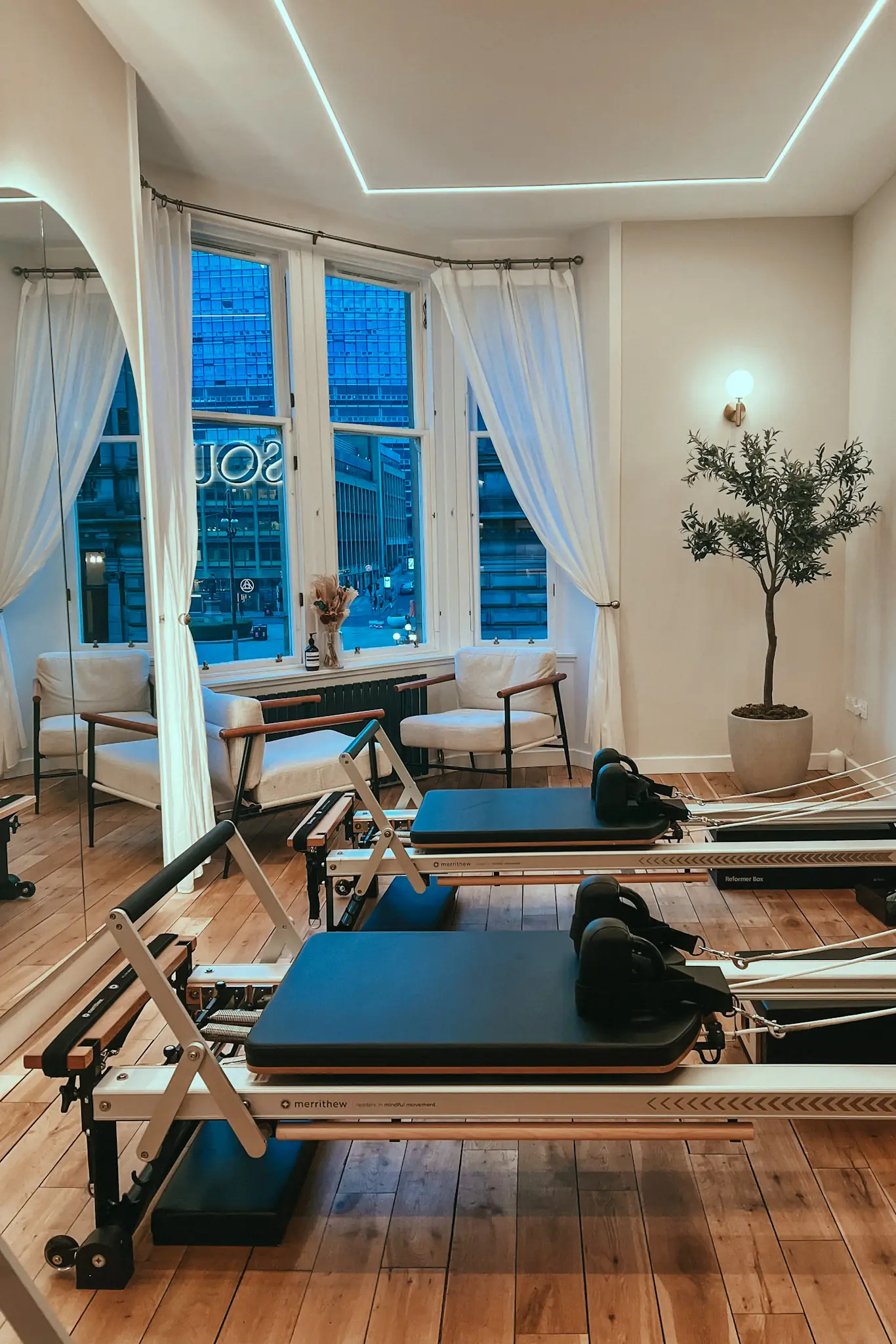
I complemented my runs with yoga - sometimes even puppy yoga (left) - and Reformer Pilates (right).
Don't Leave Your Training to the Last Minute – Follow a Plan!
Start your training earlier rather than later – aim for at least 12 weeks of solid preparation for your half marathon. This gives you plenty of time to gradually build up your mileage, work on your speed, and it also leaves some extra room in case life gets in the way (like that cold that hits at the worst possible time or an injury that flares up, requiring some extra rest).
When I trained for my own half marathon, I kept putting it off. By the time I actually started, I only had 10 weeks until race day. If I were to do it again, I’d definitely give myself more time to train. There were days I had to rest my knee or ankle, and that ate into my training schedule.
So, make sure you give yourself plenty of time to train and stick to a solid half-marathon plan.
Gradually Build Up Your Mileage – No Shortcuts!
Don't rush your training, even if you’ve left it a bit late to start. Trying to jump from 5km to 15km overnight is a recipe for disaster. It's the sure-fire way to get injured!
Take it slow and gradually build up your mileage each week. If you’re following a decent half-marathon training plan, this should be built in, but if not – do not try to skip ahead and push your body past its limits. Your body needs time to adapt, so ease into those longer runs and let your muscles gradually get stronger!
Do a Practice Half-Marathon Before Race Day
About 1-2 weeks before race day, you’ll want to do a practice half-marathon. Aim for a run between 18-21km. It’ll give you a real sense of your pace and help you understand how you’ll cope on the big day.
A practice run is also perfect for testing out your mid-race snacks and seeing if you’ll need an energy boost to power through. Once you’ve nailed that run, you’ll feel much more confident, knowing you’ve got race day in the bag!
Keep a Consistent Pace for the Whole Race
One of the biggest mistakes you can make during a half marathon is starting off way too fast in the first couple of kilometres – you’ll burn out quicker than you think! I’ll admit, I was guilty of this myself during my own race. I think it was the excitement of race day, but take it from me – try to maintain a consistent pace for the whole 21km. It’ll help you conserve energy!
For me, a great way to gauge my pace during training was by chatting to my mate while we ran. If I could hold a conversation without feeling like I was gasping for air, I knew I was on the right track.
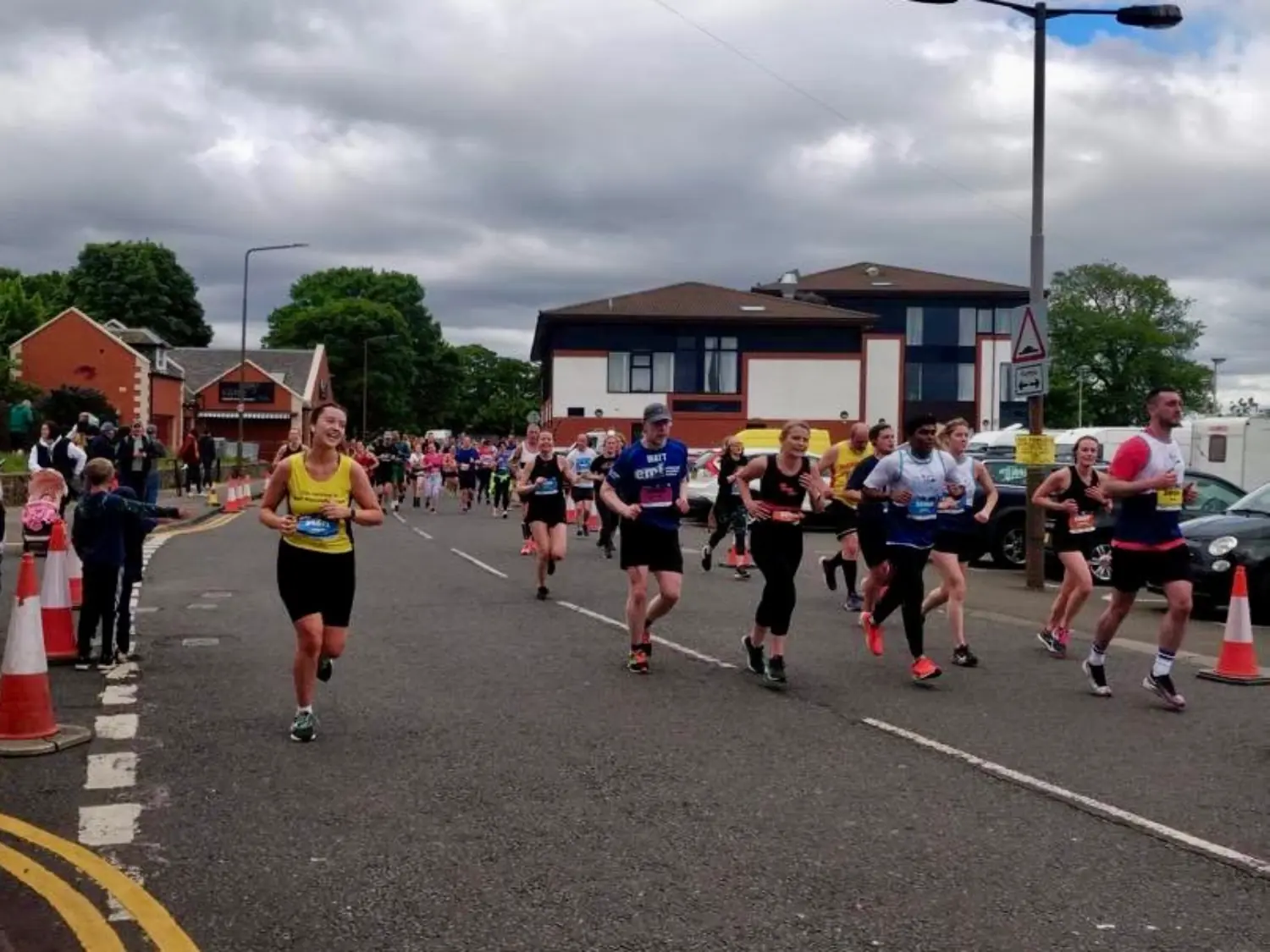
Get Yourself a Training Buddy
If you can, find yourself a training buddy – someone who’ll also double up as your accountability partner. It could be anyone, whether it’s a family member, a friend, a work colleague, or even a stranger you meet at the running club. Having a training buddy is a game-changer when it comes to staying motivated, and you’ll support each other through the ups and downs of training.
Plus, let’s be honest – having company during long runs makes a huge difference. It’s way more enjoyable and helps with safety too, especially if you’re out running early in the morning or late at night. My friend and I signed up for the half marathon together, and having someone to train with made the whole process so much more fun. It was also an amazing achievement we’ll always share!
If You Get Injured, Take It Easy!
Injuries happen, and when they do, the best thing you can do is take it easy and rest up. Pushing through the pain and continuing to run will only make it worse. If you still want to stay active, keep doing low-impact exercises like stretching, swimming, or yoga – but always check with a health professional first to make sure it’s safe.
My friend, who ran the half marathon with me, got runner’s knee during training and had to adjust her workouts for a couple of weeks to avoid high-impact exercises. The rest was crucial to help heal her knee, and she still managed to complete the half marathon – proof that sometimes, slowing down is the best way to keep going!
Nutrition, Nutrition, Nutrition!
When it comes to half-marathon training, nutrition is EVERYTHING! A good balance of nutrients, healthy foods, and proper hydration can seriously boost your performance and help your body recover. It’s worth doing a bit of research into what nutrition plan works best for you.
I’ll admit, I wasn’t great at this in the beginning. After my long runs, I was always starving, and let’s just say, I didn’t exactly make the healthiest choices. Sweets, chocolate, and takeaways became my go-to after each run because I convinced myself I deserved it. But it didn’t support my training at all. I really wish I’d paid more attention to my nutrition – it would’ve made such a difference to my progress!
Take It Easy Right Before Race Day
With just a day or two to go before your half marathon, now is not the time to smash out a 21km run. Seriously, step away from the running shoes! This is your chance to rest, recharge, and let your body recover so you can feel fresh on race day.
If you're itching to run, keep it light – a gentle jog or a few easy strides will do the trick, but don't push it too hard. A tough workout this close to the race won’t give your muscles enough time to recover, and you’ll end up feeling sluggish instead of strong. Trust the taper, take it easy, and save your energy for the main event!
Get Ready for Race Day!
Finally, it’s time to get ready for the big day! Make sure you’ve got everything sorted the night before – your race-day outfit, transport to and from the event, and a good idea of where the start and finish lines are. That way, you won’t be scrambling on the day, trying to find your kit or stressing about missing the race.
Also, don’t forget to fuel up with a carb-heavy meal the night before and get a proper night’s sleep. Once that’s sorted, you’re all set to crush it! Best of luck with your half marathon – you’ve totally got this!
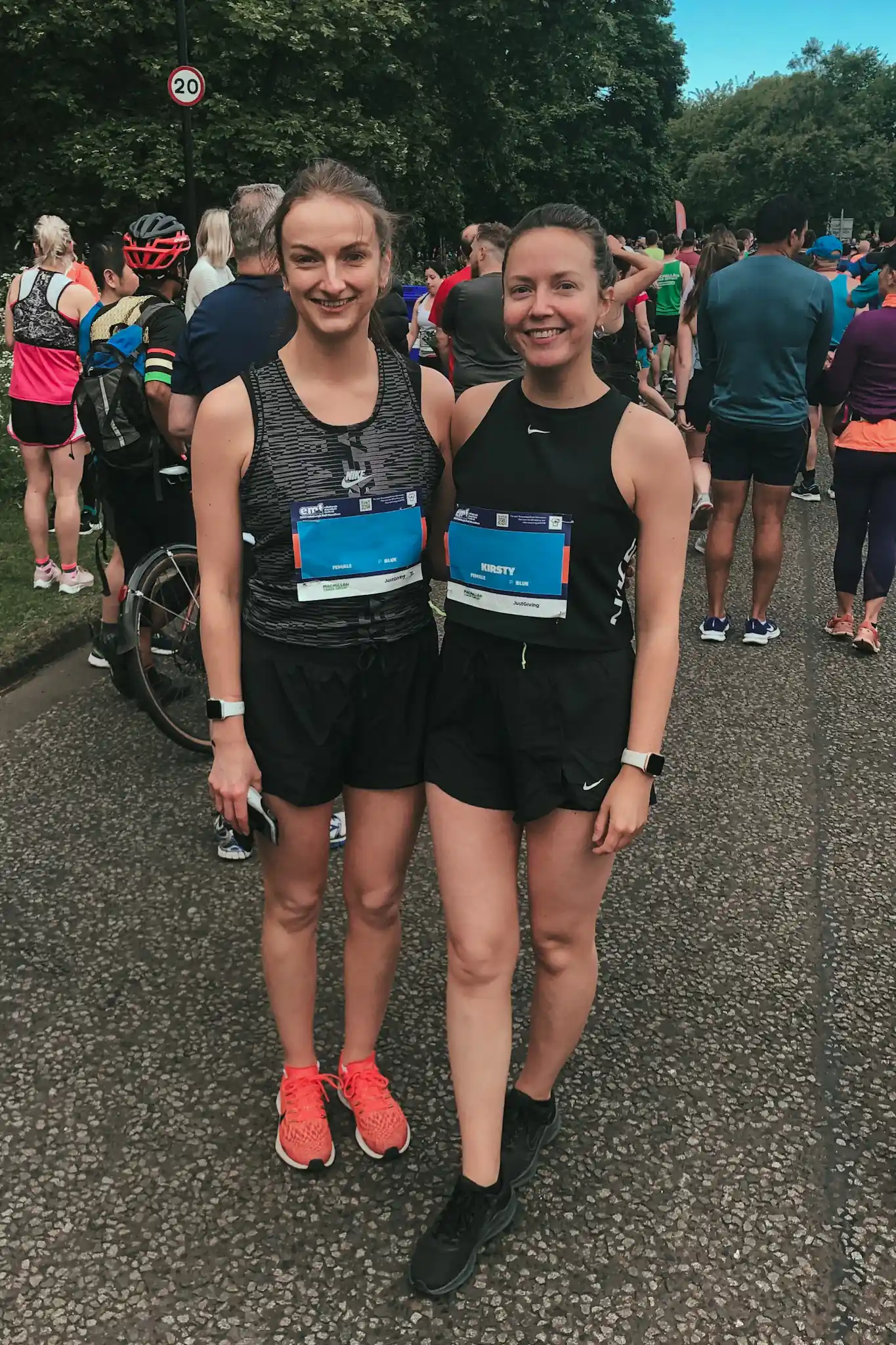
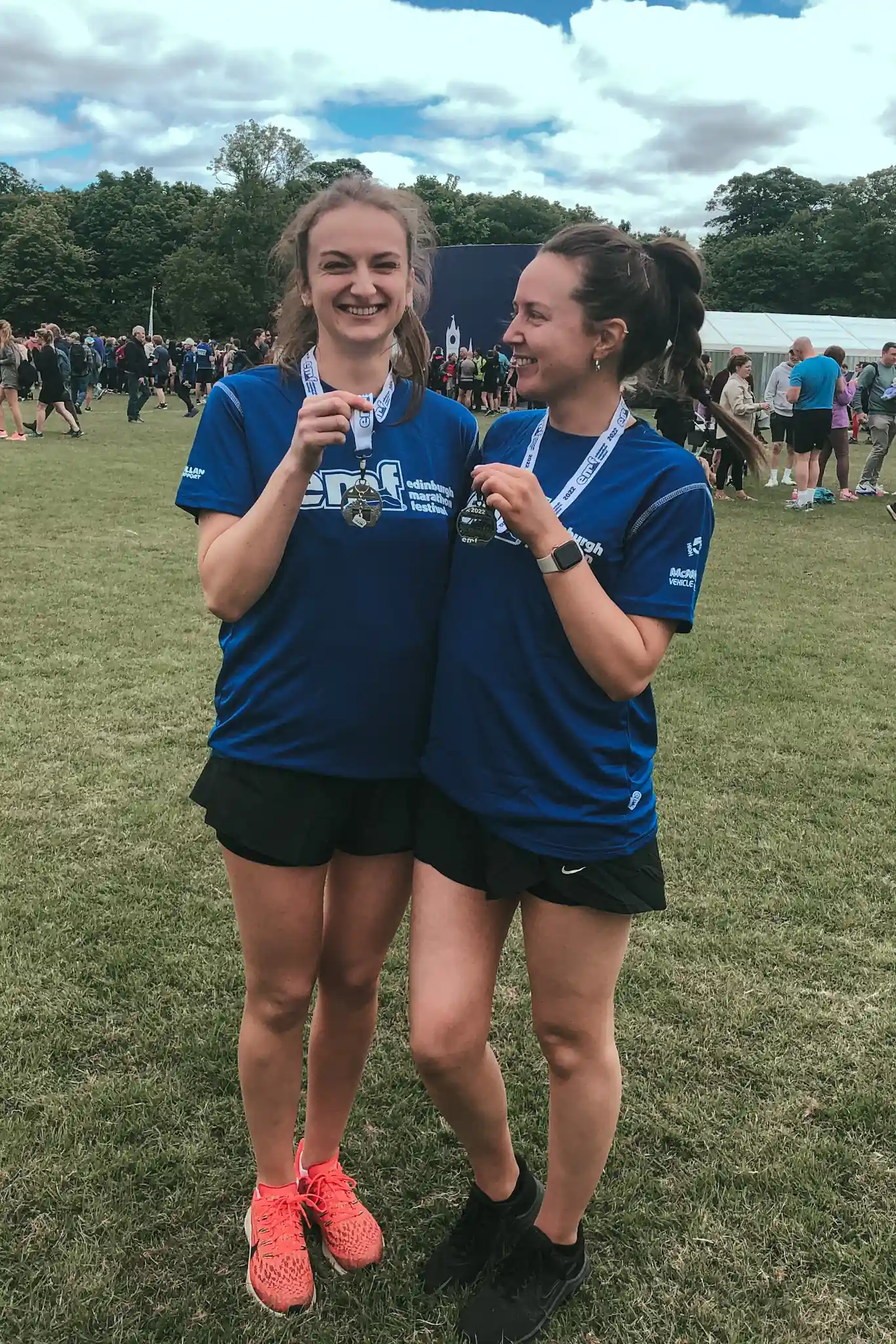
Before (left) and after (right) our half marathon race.
Support 24Countries
Thanks for stopping by! I’d love it if you could drop a comment below, share my Pinterest pins, and subscribe to my blog to stay updated with new posts. Every bit of engagement helps my little travel blog grow!
Want to go the extra mile? If you’d like to support 24Countries further (and keep me fuelled with caffeine for more writing adventures), you could treat me to a coffee! ☕
This post is all about Half Marathon Tips.
Thanks so much for reading, it means the world!
Kirsty x
More Blog Posts You'll Love

